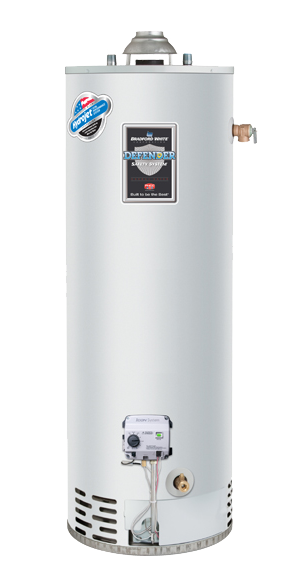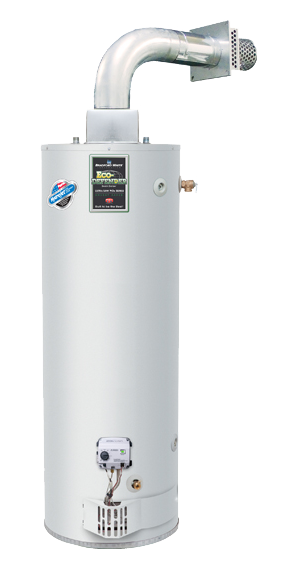
Our Services
Affordable Gas Water Heater Repair, Maintenance & Installation in Dayton & Xenia, Ohio
While electric water heaters are a popular option for residents and business owners in the Dayton area, gas water tanks are also a trendy fuel choice. Natural gas powers a lot of home appliances, from stoves and ovens to clothes dryers, so it is no surprise that people would turn to gas for heating their water supply as well. Generally speaking, gas is less expensive than electricity and gas heats water much faster than electricity, which probably helps to explain why so many prefer gas.
If you’re a Greater Dayton area resident or business owner with a gas water heater that needs repair, maintenance, or you’re interested in gas water heater installation, call Narrow Path Plumbing today! We service all brands, and we offer trusted brands for installation, such as Bradford White, and more! Get started with a free estimate today.
Call Narrow Path Plumbing Today!

Benefits of Gas Water Heaters
Installing a new gas water heater would likely lower your energy bills and give you more efficient water heating throughout your home. There are many benefits to having a gas water heater installed:
Cost
Propane gas water heaters cost approximately $25 less per month to operate than comparable electric units (Source: Energy Savings Calculator). On average, gas water heaters are up to one-third less expensive to operate than electric heaters. Over an intermediate unit’s life span (approx. ten years), propane gas water heaters can save homeowners between $3,000 and $4,000 when compared with an electric unit.
Energy Conservation
Because propane gas water heaters have a quicker recovery rate (nearly twice that of an electric water heater), they can get more hot water from the same size tank. When considering the use of space in a home, the fact that a much smaller propane water heater can do the job of a larger electric unit is an essential factor. Propane models are also highly durable and can last for many years with minimal service requirements.
Efficiency
The reference standard for the energy efficiency of storage water heaters is the “energy factor,” which is based on delivering 64 gallons of hot water per day, no matter what size water storage tank is used. Taking into account combustion efficiency and standby loss, the energy factor for a gas storage water heater generally ranges between 0.50 and 0.65. Smaller units have higher energy factors because their smaller volumes and surface areas result in less standby loss. For tightly sealed houses, sealed combustion or power-vented water heaters are the best.
Provides Fast Heat
As opposed to electric hot water cylinders, gas water heaters work twice as fast. In addition, they recover much more quickly than electric models, which means your hot water supply is replenished rapidly. So if you have a more enormous household or high demand for hot water in your home, a gas heater is definitely a better option.
Professional Gas Water Heater Installation You Can Trust in Dayton & Xenia
When determining if a gas water heater is right for you, the first thing you need to look at is whether or not gas is available to you. Calling a professional is imperative. For a lot of people if gas appliances are already in the home then this is a very affordable fuel option to switch over to. In some areas, however, gas might not be a viable option, especially if you don’t have gas lines running near your residence. Moreover, even if you have accessible gas fuel nearby, running the line to your residence might be too expensive and out of your budget. We install trusted brands such as Bradford White, Rheem, and more!
How Gas Water Heaters Work
As indicated by their name, a tank-type water heater connects to your water lines and heats cold water, and stores the hot water until it is needed in the home via your plumbing fixtures and appliances. A gas water heater functions through what in physics is knowns as convection — a law that defines how heat rises. With gas water heaters, the cold water runs to the tank through a cold water supply line that fills the tank with a constant supply of cold water. The dense cold water at the bottom of the tank is then given heat by a gas burner located below the sealed tank. When the water warms up, it rises into the tank, where it is drawn off by the hot water discharge pipe to provide hot water wherever it is needed. The hot water discharge pipe is a lot shorter than the dip tube because its job is to funnel off the hottest water, which is always at the top of the tank.
The gas burner that heats the cold water coming in is controlled by a control valve, pressure relief valve, drain valve, vent hood and gas regulator assembly mounted on the side of the water heater, which includes a thermostat used to measure the temperature of the water inside the tank and turns the burner on and off as necessary to maintain the set temperature of the water.

Why Choose Narrow Path Plumbing For All Your Plumbing Needs in Dayton & Xenia?
If you need prompt plumbing services you can depend on but don’t drain your bank account, you need Narrow Path Plumbing. The plumbing industry is competitive here in the Greater Dayton area. In order to earn a strong reputation for honesty and high-quality work at competitive prices — a plumbing company had better walk the Narrow Path and work hard to set itself apart from the competition.
At Narrow Path Plumbing, we strive to do just that. If you ask our customers, they will tell you our name says it all. We stand behind our work as a local family-owned and operated plumbing business serving the Greater Dayton area. We’ve been doing this for over 30 years. We are the Miami Valley’s trusted local plumbing company, serving all your plumbing needs, including plumbing repair, plumbing installation, excavation, winterization, pipework, water heaters, sewer repairs, plumbing inspection, drainage work, emergency plumbing repairs and more.
We are always available, 24 hours a day, 7 days a week serving all of Greater Dayton.
We offer everything from routine maintenance and help with everyday issues with water lines to toilet flooding and broken sinks and other emergency plumbing repairs and septic system repairs and sewer lines. We take your residential plumbing emergencies very seriously and guarantee all of our estimates, and don't add on trip charges when you need extensive expert plumbing assistance. Our local plumbers in Dayton provide comprehensive plumbing service for common household plumbing problems such as running toilets, clogged drains, faucets, basins, faulty sump pumps, water heater leaks and more.
We are your experts for toilet repair, drain problems, pipe problems, drain cleaning, toilet problems, emergency plumber, sewer lines and excavation, faucet repair, sink repair, sump pumps, shower repair, sink repair, drainage issues, toilet clogging and toilet over flooding, garbage disposal repair, dishwasher repair and installation, leak repair, washing machines, water heaters, pipes
We also help with water damage cleanup, water removal, emergency flooding services, basement flooding, clean up, mold remediation, mold removal and more. We service all plumbing brands, such as Moen, Bradford White, and more! We offer water heater installation and water heater repair in addition to home winterization, Excavation For Water, Sewer, or Gas Lines.
Frequently Asked Questions
The experts of Narrow Path Plumbing have your back! Here we’ve listed frequently asked plumbing questions we receive from homeowners. If you have any other questions, feel free to contact us today by calling us or sending us a message. We’re here for you!
Call Narrow Path Plumbing Today!
Why don't I have hot water?
Before troubleshooting a gas water heater, check if the gas is adequately supplied to your house and your water heater; there might be obstructions, shortage, or the main gas valve is closed. If hot water suddenly becomes cold, the water usage might have been exceeding the tank capacity. If that is the case, wait for the water heater to recover. Call us right away!
What size water heater do I need?
Traditional water heaters have long been considered the better choice for large homes. However, not all tank water heaters come in the same shape and size. If you have a large family – say four or more – you will want to install a water heater with a tank that can hold between 50 and 80 gallons of water at a time. On the other hand, if you live in a small home with only one other person, you will probably be better suited to a unit that holds 23-36 gallons. If you’re looking to install a tankless water heater, conversely, the size of the unit is less important than the system’s flow rate (another advantage of tankless water heaters is that they are always fairly small, and therefore relatively easy to access.) A tankless heater’s flow rate is measured in gallons per minute or GPM. The bigger your home is, the higher GPM your tankless system will need to have.




